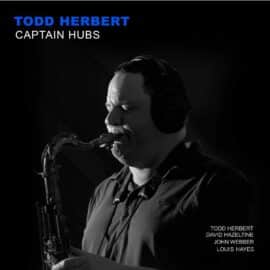| Jazz |

Todd Herbert is the kind of jazz musician who resists the spotlight even as his work demands it. For more than two decades, he has occupied a space both central and curiously understated in the jazz landscape: a saxophonist with formidable technique, deep respect for tradition, and an almost stubborn commitment to craft over celebrity. He has played with giants—Jimmy Cobb, Tom Harrell, Freddie Hubbard, Charles Earland, but he has never seemed particularly interested in positioning himself as a giant. Instead, his career has been a study in quiet persistence, a musician intent on letting the horn do the talking.
With Captain Hubs, his third album as a leader, Herbert offers a vivid reminder of why those in the know have long spoken of him with reverence. The record follows his 1999 debut, The Todd Herbert Quartet, and his self-titled 2003 release, a collection of standards that signaled both reverence for the canon and a willingness to explore its contours with fresh energy. Two decades later, the new album feels less like a return than a statement of presence: Herbert is still here, still evolving, still sharpening his voice.
Neil Tesser, the longtime Chicago jazz critic, once described Herbert as a player capable of orchestrating with “inexhaustible energy” while maintaining a tone that is “reserved, cool, and steeped in tradition.” It’s an apt description, because Herbert’s paradox is his strength: he marries fire and restraint, intensity and control. There is always motion in his playing, a restless drive, but also a kind of composure that suggests deep listening, a trust in silence and space.
On Captain Hubs, Herbert offers four original compositions, interwoven with his takes on Coltrane, Shorter, and Fred Coots. But these are not straightforward readings; they are reinterpretations that reveal the DNA of his influences while reshaping them into something distinctly his own. The bebop lineage of the 1950s is there, as is the searching intensity of the 1960s, but Herbert refuses nostalgia. His arrangements push motifs to their outer edges, stretching harmonic and rhythmic ideas until they seem ready to burst, only to rein them back with precise control. What emerges is a sound at once familiar and singular, grounded in history but alive in the present moment.
The album owes much to the company Herbert keeps. Recorded in the summer of 2024 with pianist David Hazeltine, bassist John Weber, and drummer Louis Hayes, himself a NEA Jazz Master and one of the last living links to the golden era of hard bop, the record is as much a conversation among masters as it is a showcase for Herbert’s leadership. “After a day of recording on June 25, we tracked ten sections of original and classic compositions,” Herbert recalls. “I’m deeply grateful for the opportunity to record with such extraordinary musicians. Thank you so much for listening, and I hope you enjoy.”
That humility is characteristic. Herbert’s résumé includes work with the Freddie Hubbard Quintet, the Jimmy Cobb Legacy Band, and the Charles Earland Quartet, yet he rarely foregrounds his own achievements. Instead, he frames his career as part of a larger continuum, a relay of sound and spirit passed from one generation to the next. In this sense, he embodies a certain archetype of the jazz musician: less a celebrity than a craftsman, less a brand than a bearer of tradition.
And yet, Captain Hubs suggests something more. In a cultural moment where jazz is simultaneously reverenced and marginalized, celebrated in institutions while struggling in clubs—Herbert represents a model of resilience. His music is not driven by the algorithms of popularity or the imperatives of crossover appeal. It is driven by the stubborn belief that artistry, honed over decades, still matters. That to listen closely is to discover richness. That a saxophone, shaped by breath and discipline, can still cut through the noise of the age.
There is also a generational undertone here. Louis Hayes, at nearly ninety, anchors the record with authority; Hazeltine and Weber bring their own seasoned voices. Herbert, standing among them, seems both heir and peer, one foot in the legacy of hard bop, the other in the uncertain terrain of twenty-first-century jazz. The tension in his playing, as Tesser noted years ago, is not only musical; it is existential. He is both looking back and pressing forward, at once conserving and inventing.
To call Herbert a legend might be premature; his name does not yet ring with the instant recognition of a Rollins or a Shorter. But listen closely to Captain Hubs, and it becomes clear that he has earned a place in that lineage of musicians who build their reputations not on spectacle but on substance. His sound, refined through years of relentless practice and countless nights on the bandstand, is a reminder that jazz is not merely a historical artifact but a living, breathing art form.
In that sense, Herbert’s story is not only about one album, or even one musician. It is about what it means to dedicate a life to music in an era that often undervalues such devotion. It is about the quiet conviction that art matters, even, and especially, when it is made without fanfare. And it is about the enduring truth of jazz: that somewhere, in a studio or a small club, a musician like Todd Herbert is still pushing the music forward, one note at a time.
Thierry De Clemensat
Member at Jazz Journalists Association
USA correspondent for Paris-Move and ABS magazine
Editor in chief – Bayou Blue Radio, Bayou Blue News
PARIS-MOVE, September 6th 2025
Follow PARIS-MOVE on X
::::::::::::::::::::::::
Musicians :
TODD HERBERT – Tenor Sax
DAVID HAZELTINE – Piano
JOHN WEBBER – Bass
LOUIS HAYES – Drums
Track Listing :
Captain Hubs
Prophet’s Oracle
Look Into The Abyss
You Got To My Head
In The Moment
Temple Of Silence
The Mind’s Eye
Fee-Fi-Fo-Fum
Straight Street

